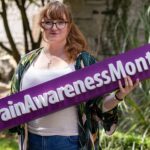49% of people with persistent pain find travelling or going on holiday difficult (1)
‘mypainfeelslike…’ campaign launches animation with Ivan Yates to help get the most out of your GP visit before going on holidays this summer
Dublin, 12th June 2017 – Research announced today by the ‘mypainfeelslike…’ campaign found that 49 percent of people living with persistent or chronic pain in Ireland find travelling or going on holiday difficult because of their pain. Just over half discuss their pain with a healthcare professional once a year or more, but almost one in five claim to never discuss their pain with a healthcare professional.1 To aid people when visiting their GPs, the ‘mypainfeelslike…’ campaign has created an animation with Ivan Yates on how to get the most from your visit – especially before going on holidays this summer [insert link to video]. The campaign is a collaboration between Grünenthal Pharma Ltd and Chronic Pain Ireland and supported by Multiple Sclerosis Ireland and The Parkinson’s Association of Ireland.
Persistent or chronic pain is any type of pain that lasts more than three months.(2) Persistent pain lasts longer than acute pain and often does not indicate ongoing damage, even though it may feel like it. According to this new research, headaches (55%) and lower back pain (51%) are the most common types of pain, with over half of those with persistent pain having experienced either condition.1 The research also revealed that 52 percent of people living with persistent pain always take their medicine as instructed, while a third take their medication, but then stop when the pain eases.1 Additionally, 49 percent have not had their treatment or medication reviewed in the past year.(1)
“Persistent pain has a serious impact on people’s lives and wellbeing. It requires an ongoing and evolving treatment plan that help people move away from a persistent pain cycle – allowing them to enjoy things like travelling and holidays”, says Dr Paul Murphy, Consultant in Pain Medicine in St Vincent’s Hospital, Dublin. “Engaging in an active management plan can help patients reduce pain symptoms, improve mood and increase function. It is also crucial that people comply with any treatment prescribed by their care team to help manage their pain – be it medication, exercises or other treatment options like mindfulness and relaxation practices. I would encourage people living with pain to go to mypainfeelslike.ie and utilise the resources available, including this new GP visit animation, the my pain questionnaire and the Pathways Through Pain podcasts and videos”.
“Before I went travelling for six months, I made an appointment with my GP to get my back pain re-assessed and to ensure my treatment and medications were up-to-date before I left the country”, says broadcaster Ivan Yates, who lives with persistent lower back pain. “My GP gave me some useful tips and extra medication so I could manage my pain when travelling. But I also know that I must be able to move about and lie down when needed so I had to travel by boat, rail or car – which was a great way to see the country, the good and bad parts!”
Just over four in ten of those surveyed said the car is their preferred mode of transport when travelling to help manage their pain.1 However, unlike Ivan, 40 percent do not take any additional steps before travelling to ensure that their trip is not negatively affected by their pain.1 Only 24 Date percent take extra medication, just 17 percent pack light and lift their luggage in stages and 35 percent use a neck support when travelling to try and manage their pain.(1)
Steps to help you maximise your time with your GP:
1. Fill in the my pain questionnaire on mypainfeelslike.ie to help you understand your pain
2. Use the 12 pain images to help you describe what your pain feels like
3. Make a list of your medications and include all other activities you do to manage your pain e.g. yoga, mindfulness etc.
4. Ask yourself questions about your pain, such as; what makes it better or worse? Is it there all the time? What activities do you have to stop because of your pain?
5. Don’t forget to tell your doctor if you are going away so you can plan your treatment together
For more coverage see links below
http://www.thejournal.ie/living-with-chronic-pain-ivan-yates-3439601-Jun2017/
-ENDS-
Notes to editors
About persistent pain
It is estimated that approximately 1.65 million people in Ireland have pain3, with 13 percent living with pain for 10 years or more1. Persistent pain can be caused by a condition (e.g. arthritis, fibromyalgia), an isolated event (e.g. injury, infection), or a non-traceable occurrence.4 While acute pain is short term and it resolves with healing of the underlying injury, it is often described as persistent pain that disrupts sleep and normal living and serves no protective function and degrades health and functional capability.5 Neuropathic or nerve pain is caused by damage to or dysfunction of the nerves, spinal cord, or brain. Typical effects are felt as a burning or tingling type of pain.6
About the ‘mypainfeelslike…’ Campaign
This national campaign aims to raise awareness of pain and support patients when communicating with healthcare professionals. For more information go to mypainfeelslike.ie.
The Pathways Through Pain multimedia guide is now available on mypainfeelslike.ie and includes practical information to help people manage their pain, videos with Advanced Nurse Practitioner in Pain Management in Beaumont Hospital, Joanne O’Brien and Susan Murphy, Clinical Physiotherapist, University Hospital Waterford; a mindfulness practice podcast with Orla Spencer, Clinical Psychologist in the Pain Service in Tallaght Hospital; and a pain management rehabilitation conversation with a patient who attended the programme in Tallaght Hospital in 2016.
The initiative has been developed in collaboration with Grünenthal – a company constantly searching for innovative ways to better treat patients with pain and to support communication between patients and physicians.














